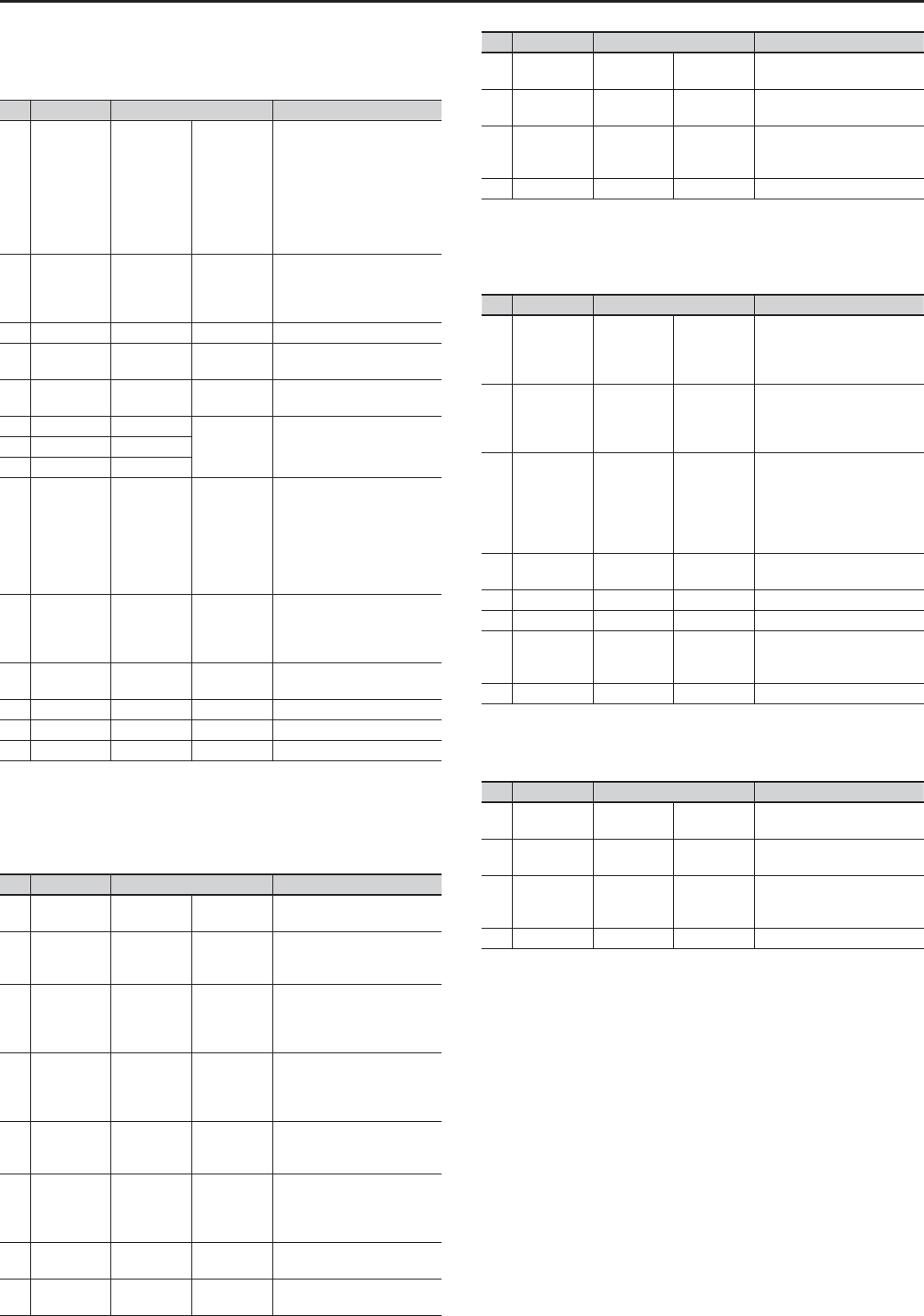
MIDI Implementation
30
●0159: Tape Echo
A virtual tape echo that produces a realistic tape delay sound. This simulates the tape
echo section of a Roland RE-201 Space Echo.
No Parameter Value Description
1 Mode 0–6
S, M, L, S+M,
S+L, M+L,
S+M+L
Combination of playback
heads to use
Select from three di erent
heads with di erent delay
times.
S: short
M: middle
L: long
2
Repeat Rate
#1
0–127 0–127
Tape speed
Increasing this value will
shorten the spacing of the
delayed sounds.
3 Intensity 0–127 0–127 Amount of delay repeats
4 Bass 0–30 -15–+15 dB
Boost/cut for the lower range
of the echo sound
5 Treble 0–30 -15–+15 dB
Boost/cut for the upper range
of the echo sound
6 Head S Pan 0–127
L64–63R
Independent panning for
the short, middle, and long
playback heads
7 Head M Pan 0–127
8 Head L Pan 0–127
9
Tape
Distortion
0–5 0–5
Amount of tape-dependent
distortion to be added
This simulates the slight tonal
changes that can be detected
by signal-analysis equipment.
Increasing this value will
increase the distortion.
10
Wow/Flutter
Rate
0–127 0–127
Speed of wow/ utter
(complex variation in pitch
caused by tape wear and
rotational irregularity)
11
Wow/Flutter
Depth
0–127 0–127 Depth of wow/ utter
12 Echo Level #2 0–127 0–127 Volume of the echo sound
13 Direct Level 0–127 0–127 Volume of the original sound
14 Level 0–127 0–127 Output level
●015a: Reverse Delay
This is a reverse delay that adds a reversed and delayed sound to the input sound. A
tap delay is connected immediately after the reverse delay.
No Parameter Value Description
1 Threshold 0–127 0–127
Volume at which the reverse
delay will begin to be applied
2
Rev Delay
Mode
0–1 ms, note
When this is set to “note,” the
e ect is synchronized with the
tempo.
3
Rev Delay
Time #1
0–127 1–1270 ms
Delay time from when sound
is input into the reverse delay
until the delay sound is heard
(Hz)
4
Rev Delay
Time
0–21 note
Delay time from when sound
is input into the reverse delay
until the delay sound is heard
(note)
5
Rev Delay
Feedback
49–89 0–+80%
Proportion of the delay sound
that is to be returned to the
input of the reverse delay
6
Rev Delay HF
Damp
0–17
200–8000 Hz,
Bypass
Frequency at which the
high-frequency content of the
reverse-delayed sound will be
cut (Bypass: no cut)
7
Rev Delay
Pan
0–127 L64–63R
Panning of the reverse delay
sound
8
Rev Delay
Level
0–127 0–127
Volume of the reverse delay
sound
No Parameter Value Description
9 Low Gain 0–30 -15–+15 dB
Amount of boost/cut for the
low-frequency range
10 High Gain 0–30 -15–+15 dB
Amount of boost/cut for the
high-frequency range
11 Balance #2 0–100
D100:0W–
D0:100W
Volume balance of the original
sound (D) and the delay sound
(W)
12 Level 0–127 0–127 Output volume
●0172: Lo-Fi
This is an e ect that intentionally degrades the sound quality for creative purposes.
No Parameter Value Description
1
Pre Filter
Type
0–5 1–6
Selects the type of lter
applied to the sound before
it passes through the Lo-Fi
e ect.
2 LoFi Type #1 0–8 1–9
Degrades the sound
quality. The sound quality
grows poorer as this value is
increased.
3
Post Filter
Type
0–2 O , Lpf, Hpf
Type of lter
O : no lter is used
Lpf: cuts the frequency range
above the Cuto
Hpf: cuts the frequency range
below the Cuto
4
Post Filter
Cuto
0–16 200–8000 Hz
Basic frequency of the Post
Filter
5 Low Gain 0–30 -15–+15 dB Gain of the low range
6 High Gain 0–30 -15–+15 dB Gain of the high range
7 Balance #2 0–100
D100:0W–
D0:100W
Volume balance between the
direct sound (D) and the e ect
sound (W)
8 Level 0–127 0–127 Output level
●0175: Telephone
No Parameter Value Description
1
Voice Quality
#1
0–15 0–15
Audio quality of the telephone
voice
2 Treble 0–30 –15–+15 dB
Bandwidth of the telephone
voice
3 Balance #2 0–100
D100:0–
D0:100W
Volume balance between the
direct sound (D) and the e ect
sound (W)
4 Level 0–127 0–127 Output level


















